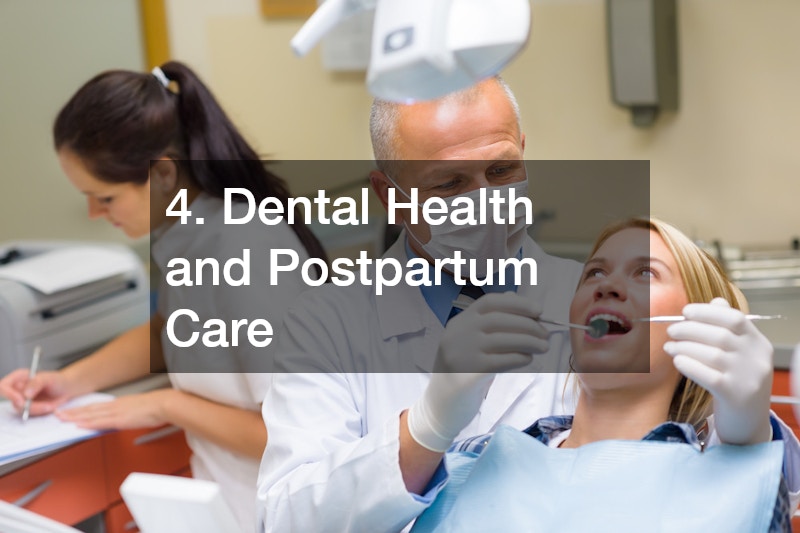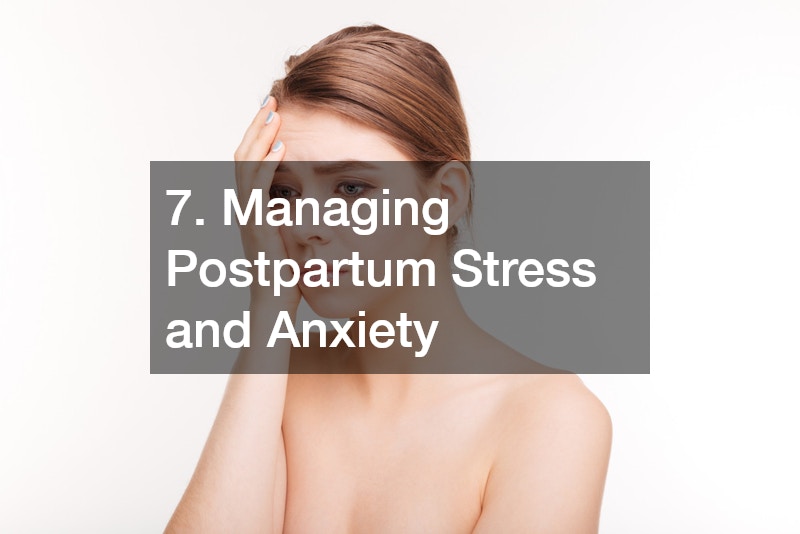Childbirth is a transformative experience, both physically and emotionally, and the postpartum period requires careful attention to health and well-being. While the joy of bringing a new life into the world is incomparable, many new mothers face unexpected challenges in the months following delivery. The body undergoes significant changes during pregnancy and childbirth, and the postpartum period is crucial for recovery. In this article, we will explore seven key health issues that require attention after childbirth and provide strategies for managing them effectively.
1. Hormonal Changes and Endocrine Health

Hormonal Shifts After Childbirth
After childbirth, one of the most significant changes a woman undergoes is hormonal fluctuations. During pregnancy, levels of estrogen, progesterone, and other hormones are elevated, supporting the pregnancy and the developing baby. However, after delivery, hormone levels drop rapidly. This sudden change can cause a variety of physical and emotional symptoms, including mood swings, hot flashes, and changes in libido. The most notable hormonal shift is the decrease in estrogen, which can lead to vaginal dryness, as well as feelings of anxiety or sadness, often referred to as the “baby blues.”
In some cases, these hormonal changes can lead to more severe issues such as postpartum depression or anxiety, which affect about 1 in 7 women. The hormonal imbalances can also impact thyroid function, leading to thyroid disorders like hypothyroidism or hyperthyroidism. These conditions can present with symptoms such as fatigue, weight changes, and difficulty concentrating.
Managing Hormonal Changes
To manage these hormonal changes, it is important to monitor your mood and physical health during the postpartum period. Women who experience extreme mood swings or signs of depression should seek help from a healthcare provider for proper diagnosis and treatment. Sometimes hormone replacement therapy (HRT) or medications like antidepressants are recommended, especially in cases of postpartum depression.
Maintaining a balanced diet, regular exercise, and managing stress can also support the endocrine system as the body recovers. Adequate sleep and avoiding overexertion can help stabilize hormonal fluctuations. For some women, seeing an endocrinologist may be necessary if there are signs of thyroid dysfunction. Additionally, consulting with a local pharmacy can be beneficial for managing medications and ensuring that the correct treatment is being followed, especially when adjusting dosages or trying new therapies. These combined strategies can help alleviate the more challenging aspects of postpartum hormonal changes.
2. Uterine Health and Postpartum Bleeding
Understanding Postpartum Bleeding
After childbirth, the uterus begins the process of returning to its pre-pregnancy size. This process is called “involution” and is accompanied by bleeding, known as lochia. Postpartum bleeding is a normal part of the recovery process, but it can be concerning, especially when it lasts longer than expected or becomes unusually heavy. Lochia starts as a bright red discharge and gradually turns brown and then white or yellow over the course of several weeks. It is important to monitor the flow and see a doctor if there is heavy bleeding or if the discharge has a foul odor, which could indicate infection.
In some cases, women may experience retained placenta, where fragments of the placenta remain inside the uterus after delivery. This can lead to heavier bleeding and infection. If left untreated, retained placenta can lead to complications such as postpartum hemorrhage (severe bleeding) or uterine infection. Moreover, women who have a history of uterine fibroids may be at a higher risk for excessive bleeding, as these noncancerous growths can interfere with the uterus’ ability to contract properly after childbirth.
Managing Uterine Health
Managing uterine health after childbirth involves monitoring the amount of bleeding and watching for any signs of abnormal bleeding or infection. It’s essential to rest and follow proper hygiene practices to reduce the risk of infection. Some women may also benefit from uterine massages or specific exercises that help stimulate uterine contractions and support involution.
In cases where bleeding is excessively heavy or prolonged, it’s crucial to contact a healthcare provider. Treatment may include medications to help the uterus contract or, in rare cases, a surgical procedure to remove retained placenta. Regular postpartum check-ups will help monitor uterine health and ensure the healing process is progressing as expected.
3. Pelvic Floor Health

The Impact of Pregnancy on the Pelvic Floor
The pelvic floor, the group of muscles and tissues that support the uterus, bladder, and bowels, undergoes significant strain during pregnancy and childbirth. The weight of the growing baby and the physical act of delivery can stretch and weaken the pelvic floor muscles. As a result, many women experience pelvic floor dysfunction after childbirth, which can manifest as urinary incontinence, pelvic organ prolapse, or painful intercourse.
Pelvic floor health is often neglected, but addressing these issues is crucial for long-term well-being. For some women, pelvic floor dysfunction can affect their quality of life, leading to embarrassment or discomfort. It’s important to recognize the signs and seek proper treatment.
Managing Pelvic Floor Health
Pelvic floor physical therapy is an excellent way to address the impact of childbirth on the pelvic floor muscles. A physical therapist specializing in postpartum recovery can teach exercises such as Kegel exercises, which help strengthen the pelvic muscles and prevent incontinence. These exercises can be done at home and are a simple yet effective way to improve pelvic floor health.
Furthermore, other treatments, such as biofeedback or vaginal weights, may be recommended for women experiencing more severe pelvic floor issues. Many women benefit from visiting a physical therapy clinic, where a trained therapist can offer personalized guidance and techniques for improving pelvic floor strength and function. In some cases, surgery may be needed to correct prolapse or other significant pelvic floor disorders. Consult with a healthcare provider to determine the best course of action based on individual needs.
4. Dental Health and Postpartum Care

The Effect of Pregnancy on Oral Health
Many women are surprised to learn that pregnancy can have a significant impact on dental health. During pregnancy, hormonal changes can lead to an increased risk of gum disease (gingivitis) and tooth decay. Increased blood flow to the gums can cause them to become swollen and bleed more easily, while changes in diet and morning sickness may contribute to plaque buildup and cavities.
During the postpartum period, dental health remains important. After childbirth, women are often focused on caring for their newborn, which can lead to neglecting their own oral hygiene. This can exacerbate any existing oral health issues that arose during pregnancy and increase the risk of developing more severe problems, such as periodontal disease.
Managing Postpartum Dental Health
To manage dental health postpartum, it’s important to maintain a good oral hygiene routine. Brush your teeth at least twice a day, floss regularly, and visit a dentist for a postpartum check-up. If you had any dental issues during pregnancy, such as gum disease or cavities, it’s advisable to address them during this time to avoid further complications.
For a thorough evaluation, visit a dentist office where your dentist can assess your oral health and provide guidance on the best treatments. A dentist may recommend professional cleanings or treatments to help restore oral health. For women experiencing significant dental issues, a referral to a periodontist or oral surgeon may be necessary. It’s also essential to stay hydrated, eat a balanced diet, and avoid sugary snacks, which can contribute to dental problems. Many dental services can help address any issues early, preventing more serious complications later.
5. Foot and Joint Health
The Physical Impact of Pregnancy on Feet and Joints
Pregnancy places additional strain on the body, particularly on the feet and joints. The added weight, changes in posture, and the hormone relaxin, which loosens ligaments in preparation for childbirth, can lead to foot pain, joint instability, and discomfort. After childbirth, these issues may continue, as the body adjusts to its new normal. Foot issues such as flat feet, swelling, and changes in arch height are common postpartum complaints.
Joint pain, particularly in the hips, knees, and lower back, is also prevalent after childbirth due to the shift in posture and the strain of carrying a baby for nine months. These issues can make it challenging to care for a newborn and engage in regular physical activity.
Managing Foot and Joint Health
To manage foot and joint health after childbirth, it’s essential to rest and give the body time to recover. Using proper footwear with good arch support can alleviate foot pain and reduce swelling. For joint pain, gentle stretching, yoga, and strengthening exercises can help improve flexibility and reduce discomfort.
Physical therapy may be beneficial for those experiencing persistent joint pain or discomfort. A physical therapist can develop a customized plan to strengthen muscles, improve posture, and address any imbalances that may have developed during pregnancy. If foot or joint pain persists or worsens, it may be helpful to consult with a foot doctor, who can assess the condition and provide targeted treatments or recommend further steps to improve mobility and reduce discomfort.
6. Postpartum Infections and Severe Complications
Recognizing Postpartum Infections
Infections are a significant concern after childbirth, especially if there were complications during delivery, such as a cesarean section or vaginal tears. Common postpartum infections include endometritis (an infection of the uterine lining), urinary tract infections (UTIs), and infections of the episiotomy site or cesarean incision.
Signs of a postpartum infection can include fever, chills, foul-smelling discharge, or pain around the incision or perineum. If not addressed promptly, infections can lead to more serious complications, including sepsis, which is a life-threatening condition that requires immediate medical care.
Managing Postpartum Infections
To manage the risk of postpartum infections, it’s important to maintain proper hygiene and follow your healthcare provider’s instructions for caring for any incisions or wounds. Always wear loose-fitting clothing to avoid irritation, and use pads instead of tampons to reduce the risk of introducing bacteria into the vaginal area.
If you notice any signs of infection, such as unusual discharge, fever, or increased pain, contact your healthcare provider immediately. If you are unable to reach your provider or need immediate attention, visiting an urgent care center can provide fast access to medical care and treatment. Infections are typically treated with antibiotics or other medications, but early intervention is key to preventing complications.
7. Managing Postpartum Stress and Anxiety

The Emotional Toll of Postpartum
The postpartum period can be emotionally overwhelming for many women. Sleep deprivation, hormonal changes, and the responsibility of caring for a newborn often lead to stress, anxiety, and even depression. It is common to experience mood swings, anxiety, or feelings of inadequacy during this time, and these emotional shifts are often exacerbated by challenges like breastfeeding difficulties or lack of support. Recognizing the signs of postpartum anxiety or depression early is crucial, as these conditions can have lasting effects on both the mother and the baby.
Managing Stress and Anxiety
Managing postpartum stress and anxiety is essential for both the mother’s well-being and the overall health of the family. One of the most effective ways to reduce stress is by establishing a strong support system. This can include family members, friends, or a postpartum doula who can offer emotional and practical assistance, giving the mother the time and space to rest and recharge. Feeling comfortable asking for help is key, as it reduces isolation and improves emotional resilience.
Incorporating self-care practices such as mindfulness, meditation, and deep breathing exercises can also help manage anxiety. Regular physical activity, such as taking short walks, can boost mood and ease stress. Establishing a sleep routine for both mother and baby can also improve rest quality, especially when sleep is disrupted.
If feelings of anxiety or depression become overwhelming or persistent, seeking professional help is important. Cognitive-behavioral therapy (CBT) and other counseling techniques are effective in treating postpartum anxiety and depression, and in some cases, medications such as antidepressants may be prescribed to help stabilize mood while other therapeutic approaches are used.
Alternative Approaches to Managing Stress
For some women, alternative medicine may provide additional support in managing postpartum stress and anxiety. Alternative medicine doctors can offer treatments such as acupuncture, herbal remedies, or other holistic practices like energy healing. Acupuncture is believed to help balance the body’s energy and alleviate anxiety and depression, while certain herbs, under a doctor’s supervision, can also help reduce stress levels. These alternative approaches can complement traditional therapies, but it’s important to consult with healthcare providers to ensure the safety and effectiveness of any treatments.
Support Groups for Postpartum Mental Health
Joining a postpartum support group can also be an effective way to cope with emotional challenges. These groups provide a safe, supportive environment where mothers can share experiences, challenges, and triumphs. Many hospitals, community centers, and online platforms offer support groups where mothers can connect with others facing similar issues. These groups help reduce feelings of isolation and offer a sense of community, which can increase emotional resilience during the challenging postpartum period.
In Closing
The postpartum period is a time of recovery and adjustment for new mothers, and it is essential to monitor and address the health issues that can arise after childbirth. From hormonal changes and uterine health to mental well-being and physical recovery, every aspect of postpartum care is important for ensuring long-term health. By being proactive, seeking appropriate care, and utilizing support systems, new mothers can manage these health challenges and make the transition into motherhood with greater ease. A postpartum visit checklist can help guide your recovery, ensuring that all critical areas are addressed. Always consult with healthcare providers for personalized advice and interventions to ensure that both the mother and baby remain healthy and supported.